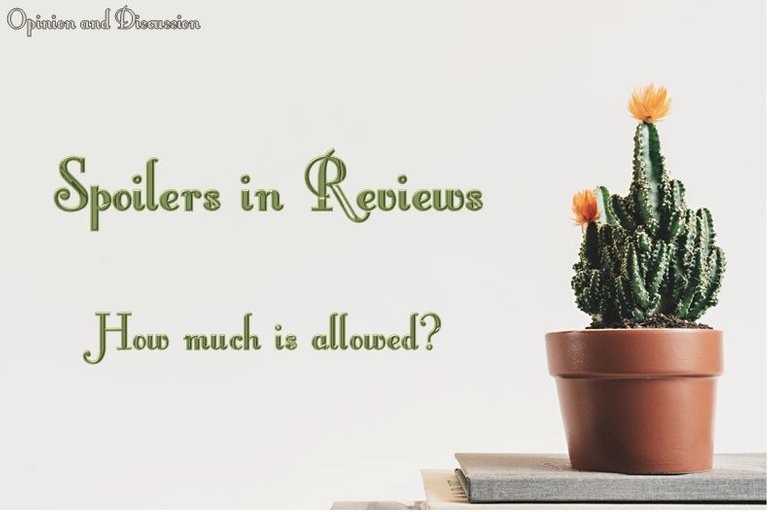Writing a review is always a fine line between wanting to tell your audience about all the great and terrible things that could influence their decision, and not wanting to tell too much. You don’t want to ruin their experience but you also don’t want to be too vague.
This is my opinion about how much I want to be given away in a review, feel free to disagree with me. While I will mostly talk about books this can be applied as well to movie, theatre or game reviews (or whatever narrative media you may enjoy).
What is there to spoil?
A spoiler can be all sorts of things from giving away essential plot elements like unexpected twists or minor things like backstory and details from later in the book. I personally have a habit of being told minor twists a chapter or an episode before there are finally reveled. I don’t know why but that happens suspiciously often.

I think most people agree on not wanting to have something spoiled for them. However, sometimes reviewers have a certain problem: The most interesting element of the book they want to discuss could be considered a spoiler. It really makes the book for them or is something that seems important when deciding if you might enjoy it. In this cases I mostly prefer knowing in advance since I am quite a picky reader and there are quite a lot of topics and themes I don’t care about and behaviors of characters I can’t stand.
Where my opinion probably deviates from most are trigger warnings. I noticed lately that a lot of reviewers would give things away if they are in any way controversial or problematic. I do understand it, since readers that are sensitive concerning this topics probably don’t want to find them in a book they didn’t expect them in.
My only problem with this is that these things can spoil plot elements or give you wrong expectations about how big of a plot point they actually are in the book. If reviewers warn about topics like rape, murder or self-harm in books they often don’t differenciate between it being just one small scene or reference or a relevant topic throughout the whole story, what I think is a big difference.
Spoilers as a motivator
For me, spoilers don’t always have to be a bad thing, they can also motivate to finish or actually be interested in a book, as well.
There were a lot of classic movies I watched knowing exactly how they would end and I watched them specifically because the twist sounded awesome to me. When I was in a book club I only finished an otherwise really annoying book because someone told me the female protagonist would die in a really stupid way and I wanted to find out what it was.
More minor spoilers in some reviews also made me more interested in books, especially when the official spoiler-free premise sounds really bland. Giving some interesting but not too important or surprising details can really spice it up and make the audience understand that this isn’t just a story like every other.
How much information do I want?
There is of course a big difference about the target group of the review. Some reviewers just need to discuss certain things from a book they just finished, so they make a review for other people that have already finished that one, sparking a discussion and being able to talk freely. I like watching or reading these, most of the time even when haven’t read to book.
However, most reviews are made to “sell” a book, to help make a buying decision.
So if I check out a review of a book I might want to read myself I don’t want to know everything in advance, obviously, but just reading the blurb from the back of the book out loud and telling me how much they loved it does not really help me, either. I want some details, I want to know what exactly that person liked or disliked or what other readers could, as long as these things are relevant.
Don’t tell me things that only play a really small part or happen really late in the book, that just sets wrong expectations and keeps me waiting for something that won’t happen when or how I think it will. Being too vague hinting some events can actually do the same, especially when the sentence chosen to describe it can be interpreted in various ways.
To make it easier, that’s the summary of how I’d like a review:
- Tell me about the main plot, don’t be afraid to be precise and explain characters, but don’t give away anything that happens after half the book is over.
- Don’t only say you loved or hated it: What annoyed you about the book? What was great about the book? Are these points a one time thing / relevant?
- I mostly don’t mind being outright told something will happen but I hate being given vague hints or wrong expectations.
So, what do you think about the topic? How much can you stand to be spoiled and did spoilers ever motivate you to read or watch something? Please tell me in the comments. :)

I understand your Problem and it is very difficult to answer . What i dont want to know when i read a review is if a beloved character dies for example . Dont spoil me if their is a story twist , but beside off this 2 Thinks i can forgive spoilers.
This is the reason i dont read any GoT Episode Reviews and did not read any review about Infinity War.
I really agree on character death since this can cause such an emotional response while reading.
I once read a book where I was fairly certain a character would survive because I misunderstood what I was told about the sequel, so when this character did die it was like the biggest twist ever for me.